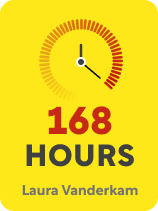

This article is an excerpt from the Shortform book guide to "168 Hours" by Laura Vanderkam. Shortform has the world's best summaries and analyses of books you should be reading.
Like this article? Sign up for a free trial here.
Do you struggle to find the time for quality leisure? How can you create more free time in the day to spend on things you like?
Many people struggle to find the time to spend on hobbies and fun activities. According to time management expert Laura Vanderkam, more often than not, the problem isn’t having any free time—it’s not being intentional about how you spend it.
With this in mind, here’s how to make the most of your free time.
Why You Should Be Intentional About Your Free Time
According to Vanderkam, if you want your free time to be meaningful, you should schedule it—otherwise, you’ll spend too much time watching TV.
Vanderkam asserts that most Americans think they have less free time than they do because they spend too much time watching TV. Most Americans claim to have just 16.5 hours of leisure time per week. However, data indicates they have 30 hours—they just don’t realize it because they spend 20 hours mindlessly watching television.
Vanderkam argues that this underestimation is a result of not being intentional about free time. TV watching isn’t necessarily a fulfilling leisure activity: One study found that it brings less joy than several other activities, such as reading or hiking. However, we choose it because it’s easy: It’s affordable, mindless, and easy to do whenever you have a few minutes.
| Why Modern Americans Aren’t Intentional About Leisure Other experts, like Digital Minimalism author Cal Newport, agree that unless you’re intentional about your leisure, you’ll fill your time with low-quality activities (like watching TV or scrolling through your phone messages). Modern data suggests that Americans have more free time than Vanderkam suggests, and that we’re spending an even greater percentage mindlessly. A 2019 survey suggests that Americans think they have less than four hours of leisure time per week. But data from the same year suggests that, in reality, Americans had nearly 35 hours of weekly leisure time. So where does all this time go? While Americans continue to devote 21 hours a week to watching TV, a 2020 study found that they’ve added on even more screen time by spending four hours daily on their mobile devices. The study didn’t differentiate between business-related apps and leisure apps. However, several of the most popular apps used were leisure-related (like Discord)—so if we assume that just half of the time Americans spend on their mobile devices is leisure-related, that adds up to 33 hours a week they’re mindlessly wasting on low-quality leisure activities. Why is this happening? Unlike Vanderkam, Newport attributes this tendency not just to a lack of planning but also to a societal shift: In recent decades, employers have demanded constant access to employees, so the line has blurred between people’s personal and professional lives. As a result, community bonds and traditions have fallen by the wayside. These lifestyle changes have created a void in satisfying and social leisure—a void we fill mindlessly with easy and affordable activities. |
Therefore, if you want to do meaningful activities in your free time, you need to be intentional about your leisure. But how?
Make Time for Leisure Activities
Vanderkam gives the following tips on how to make the most of your free time:
1) Choose your leisurely pursuits. Experiment with several items on your bucket list to find one to three activities you’d like to spend up to 10 hours on weekly. Make sure to include exercise! As Vanderkam notes, it’s both essential to your health and a unique strength because nobody else can do it for you.
2) Schedule these pursuits in your weekly calendar. Vanderkam recommends that you be flexible when scheduling these activities during the week. Consider waking up early or trading childcare duties with your spouse one night a week. And don’t forget to plan at least one fun weekend activity! Brainstorm what you’d like to do with your family or friends at the beginning of each week, then confirm those plans midweek.
3) Create lists of leisure activities that you can do in short bursts. Review your bucket list and separate the activities you can do in less than 10 minutes from those you can do in less than 30 minutes. Then, do one of those activities whenever you have small bits of free time. For example, you could doodle a picture instead of scrolling through your phone while waiting at the doctor’s office.
| How Other Experts Recommend Being Intentional About Your Leisure What are other ways to intentionally spend your leisure time? Instead of specifying that you experiment with several activities on a bucket list or focus on your unique strengths (like exercise), Newport recommends in Digital Minimalism first that you do something demanding, which will energize you more than a passive activity. Additionally, Newport suggests that you create something with your hands: Humans are driven to prove their self-worth, and when you create something, you end up with a finished product that you can point to as proof of your competence. Newport also suggests that you create a seasonal leisure plan. Each season, create a specific leisure-related goal that you want to achieve. Then, break down the steps that you’ll need to take to get there. For example, if your seasonal goal is to play 12 Beatles songs on guitar, your steps would include learning and memorizing each song. Finally, schedule time to work on them at the beginning of the week. Newport doesn’t specify how long each leisure block should be, but you could break these activities down into 10- and 30-minute segments you can do during unexpected bursts of free time: For example, spend 10 minutes searching for sheet music on your phone instead of scrolling Instagram. However, not everybody recommends that you schedule exactly when you’ll pursue leisure: One study found that if you schedule your leisure activity at an exact time (like 9 a.m.), you won’t enjoy the activity as much because it feels like work. Combat these negative effects by making only a rough schedule and being flexible about how you implement it. For example, try telling yourself that you’ll practice guitar on two early mornings instead of specifying exact dates, or planning a social weekend activity for Saturday afternoon instead of Saturday at 2 p.m. Of course, this doesn’t work in all cases: If you’re trading childcare duties with your spouse, you likely need to schedule exact times so that you both can ensure you’re off work. |

———End of Preview———
Like what you just read? Read the rest of the world's best book summary and analysis of Laura Vanderkam's "168 Hours" at Shortform.
Here's what you'll find in our full 168 Hours summary:
- How to fit a career, time with your loved ones, and leisure time into your schedule
- How to be intentional with how you spend your time
- Why you're spending too much time watching TV






